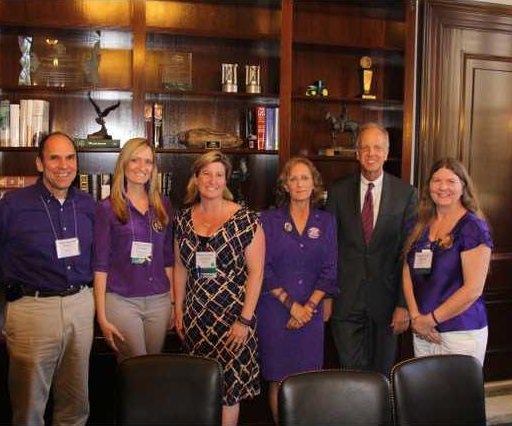When trying to describe typical Alzheimer’s symptoms, Tom Bauer, M.D., wants to ensure that his audience doesn’t confuse a little forgetfulness, which is a normal part of life, with the progressive condition.
For example, Dr. Bauer commented, it is no big deal if someone misplaces a set of car keys now and then. “But if they forget what the keys are for, that is a problem,” he said.
November is National Alzheimer’s Month, and Dr. Bauer is using the opportunity to share a few of the basics about dementia, which can come in several forms. He is a member of the Great Bend Internists team at St. Rose Ambulatory & Surgery Center.
“About 60 percent of dementia cases are the result of Alzheimer’s and its relatives,” Dr. Bauer said. “However, there is also vascular dementia that can result from a stroke, as well as the less common forms caused by Parkinson’s Disease and Huntington’s Disease.
“Most of us know a little about Alzheimer’s,” he said. “But with vascular dementia, one day the person is doing fine and the next they can’t remember how to buckle their belt. It can happen all at once.”
Alzheimer’s is often used as a general term to describe memory loss and other intellectual concerns serious enough to interfere with daily life. It is not a normal part of aging, even though the greatest risk factor is getting on in years.
The most common early Alzheimer’s symptom is difficulty remembering new information, Dr. Bauer said. This is because changes usually start in the learning area of the brain.
As the disease progresses, the symptoms become more severe. They can include disorientation, behavioral changes and unfounded suspicions of other people.
“The early symptom is memory impairment,” Dr. Bauer said. “But once it starts, it slowly but relentlessly progresses.”
When Dr. Bauer sees an older patient for the first time, he may use a mini-mental-state questionnaire. This includes questions such as: What is the date?; and What city are we in? He may also recite three words and ask the patient to repeat those words.
“In addition, we listen for clues about their judgment,” Dr. Bauer said. “And we seek information about their vocabulary, attention span and how they express emotions. In most cases, family members can tell that something isn’t quite right. When this happens, call the family doctor.”
There are two current theories about the cause of Alzheimer’s. The leading theory is that plaque deposits of a protein fragment called beta-amyloid build up between nerve cells, and/or tangles of twisted fibers of another protein called tau build up inside cells.
“Others are suggesting that neurons may get fatigued, just like muscles can get tired,” Dr. Bauer said. “If they are tired, they can’t work as well.”
There is no cure but there are a few medications that are prescribed. Some may help cells communicate better with one another, and others may slow the progression of the disease.
“We encourage any patient or family member to seek as much information as possible – even if they are just wondering if Alzheimer’s is a possibility,” Dr. Bauer said. “A large majority of what we know about Alzheimer’s has been discovered just in the last 15 years or so. There has been much progress on how it affects the brain and we will know more as the research continues.”
St. Rose doctor shares information during National Alzherimer's Month





